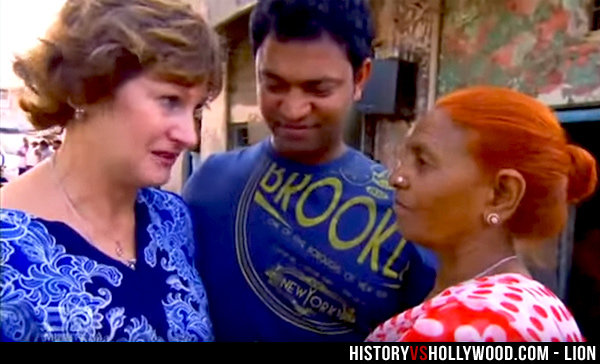What struck me about “Lion” was the relentlessness of the hero’s search for his birth mother. The movie is based on the true story of a poor Indian boy who got separated from his family when he fell asleep on a train taking him about a thousand miles away from home. On Mother’s Day, this heartwrenching film is a reminder of the deep emotional bond between mother and child, and the trauma on both sides when this connection is disrupted. It’s also a tribute to two loving mothers who, in the final scenes of the film, get a chance to meet each other in real life.
Saroo, the 5-year-old Indian boy who got lost and survived the dangers of homelessness, was eventually adopted by a loving Australian couple. He lived a comfortable, even idyllic, life in Tasmania with parents who adored him, but he was not spiritually “whole.” Despite his love for his new family, the pain of separation from his original family was constant — he thought about his mom and big brother every day. By his mid-twenties, his emotional craving for reunification with his birth family was so strong that he set out on a mission to find them, though he had only a few memories to guide him. With the right amount of obsession and drive – and loads of help from Google Maps – he was able to locate his home in a poor, remote village and reconnect with his mother and family.
“If you have ever been a child, raised a child, lost a child or met a child — or any of the above with respect to a mother — this movie will wreck you,” said reviewer A.O. Scott of the New York Times. (Note: He didn’t like “Lion” as much I did.)

Parallels with Migrant Mothers
“Lion” has a number of parallels with my Migrant Mothers Project, including Saroo’s longing to find his birth mother and reconnect with her. When mothers migrate, their children are usually left behind in the care of grandparents, aunts and other custodial relatives. But these children experience emotional trauma no matter what caused the separation from their mothers – whether they were lost like Saroo, or left behind when their moms migrate to find work, or they were given up for adoption – all research points to the deep psychological need all children have for their mothers.
As in “Lion,” meeting your mother and family after several years of separation can be a huge challenge and extremely awkward. Fortunately, the reunion of Saroo and his mother was joyful on both sides. And Saroo’s adoptive mom not only supported his search for his birth mother, she even traveled to India to meet her in person. In my case, the 23-year separation between my mother and me was difficult to bridge. By the time I met her in London, more than two decades of emotional baggage and damaging family secrets got in the way.
Similarly, the emotional impact of parental separation can shift over time – important life events like getting married and having children may expose unresolved grief in children who were separated from their mothers. In “Lion,” one random food item that was served at a party threw Saroo in the deep end because it triggered sense memories. It was this vivid reminder of his big brother that spurred his quest to find home.
So, to all the children who are missing their mothers, and to all migrant mothers separated from their children, Happy Mother’s Day!